Higher and Continuing Education in IT: Results of the My Circle Study

In eychar, it has long been believed that a successful IT career is impossible without a continuing education. Some generally recommend choosing an employer who has strong training programs for their employees. In recent years, a huge number of schools for continuing professional education have also appeared in the IT sector. Individual development plans and coaching of employees are in trend.
Observing such trends, we at My Circle added the ability to indicate the courses taken in our profile. And they conducted a study: they organized a survey and collected the answers of 3700 users of "My Circle" and "Habr" about their educational experience:
- In the first part of the study, we examine how the presence of higher and additional education affects employment and career, on the basis of what considerations IT specialists receive additional education and in what areas, which in the end they receive from it in practice, according to what criteria they choose courses.
- In the second part of the study , which will be released a little later, we will deal with the educational institutions of additional education existing on the market today, find out which of them are the most famous and which are the most popular, and as a result we will build their rating.
1. The role of primary and secondary education in employment and career
85% of IT professionals have higher education: 70% have already completed, 15% are still completing. At the same time, only 60% have a profile education for IT. Among specialists with non-specialized higher education, there are twice as many “techies” as there are “humanities”.
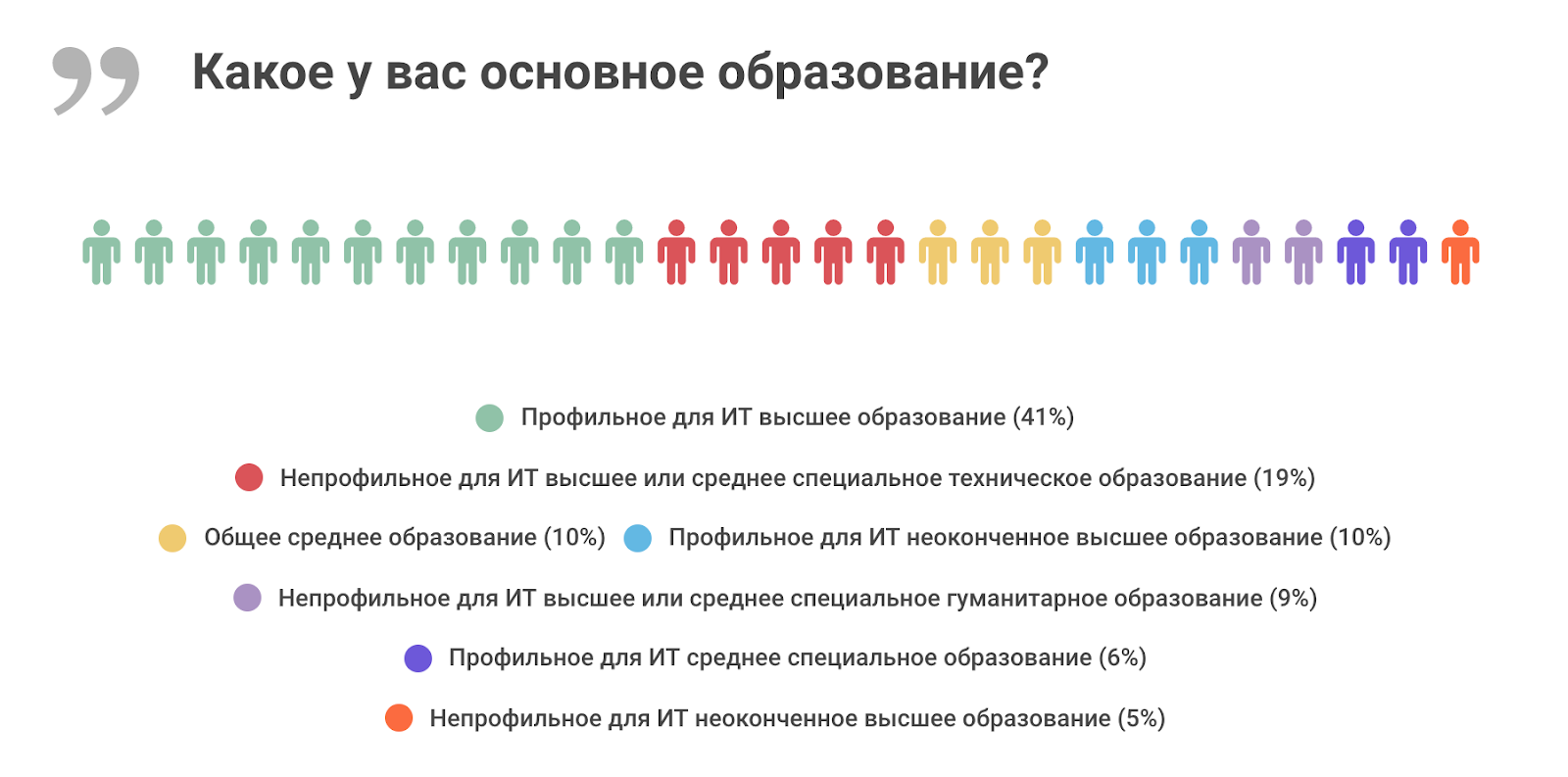
Despite the fact that two-thirds of the respondents had their main education in programming, only one in five internships were held by future employers.
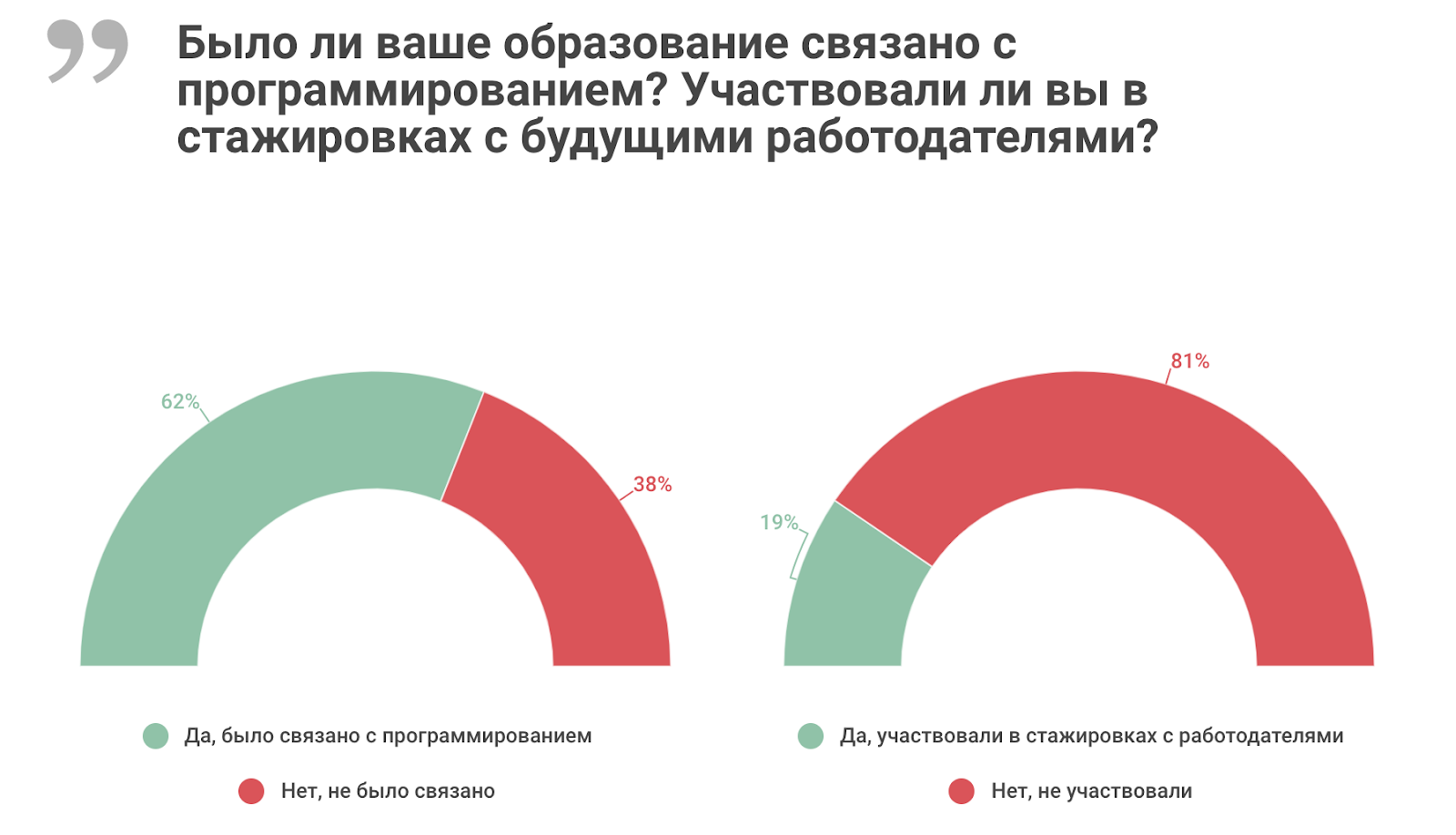
And no more than a third note that the theoretical training and practical programming skills acquired in the course of this education turned out to be useful to them.

As we see, today higher education does not adequately meet the needs of the labor market for IT: for the majority it does not provide sufficient theory and practice to feel comfortable in its professional activities.
Including this is why today almost every IT specialist in the process of his professional activity is engaged in self-education: with the help of books, videos, blogs; two out of three take additional professional education courses, most of which pay for them; every second attends seminars, meetings, conferences.
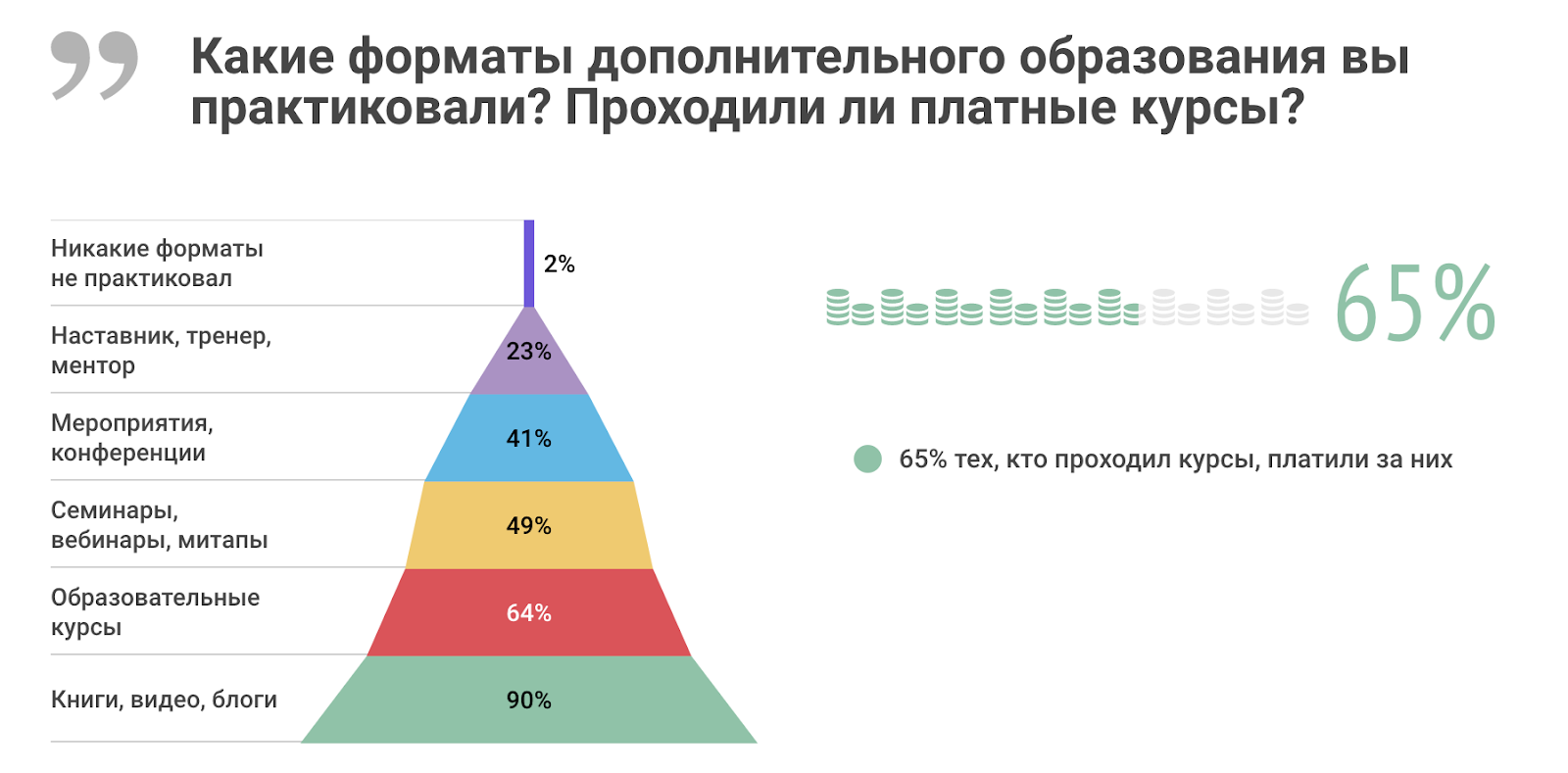
Despite everything, a university-specific higher education in 50% of cases helps applicants with employment and in 25% of cases in career advancement, a non-core higher education in IT in 35% and 20% of cases, respectively.
Asking a question about whether additional education helps in employment and career, we formulated it this way: “Did the presence of a certificate in career growth in the company help you?” And they got that in 20% helps in employment and in 15% in a career.
However, in another place of the survey, we asked a different question: “Did the completed pre-education courses help you in finding a job?” And they received completely different numbers: 43% replied that the school in one form or another helped with employment (in the form of the experience necessary for the job, replenishing the portfolio or direct acquaintance with the employer).
As you can see, higher education still plays the largest role in the development of IT professions. But further education already constitutes a strong competition for him, even overtaking a higher education, non-core for IT.
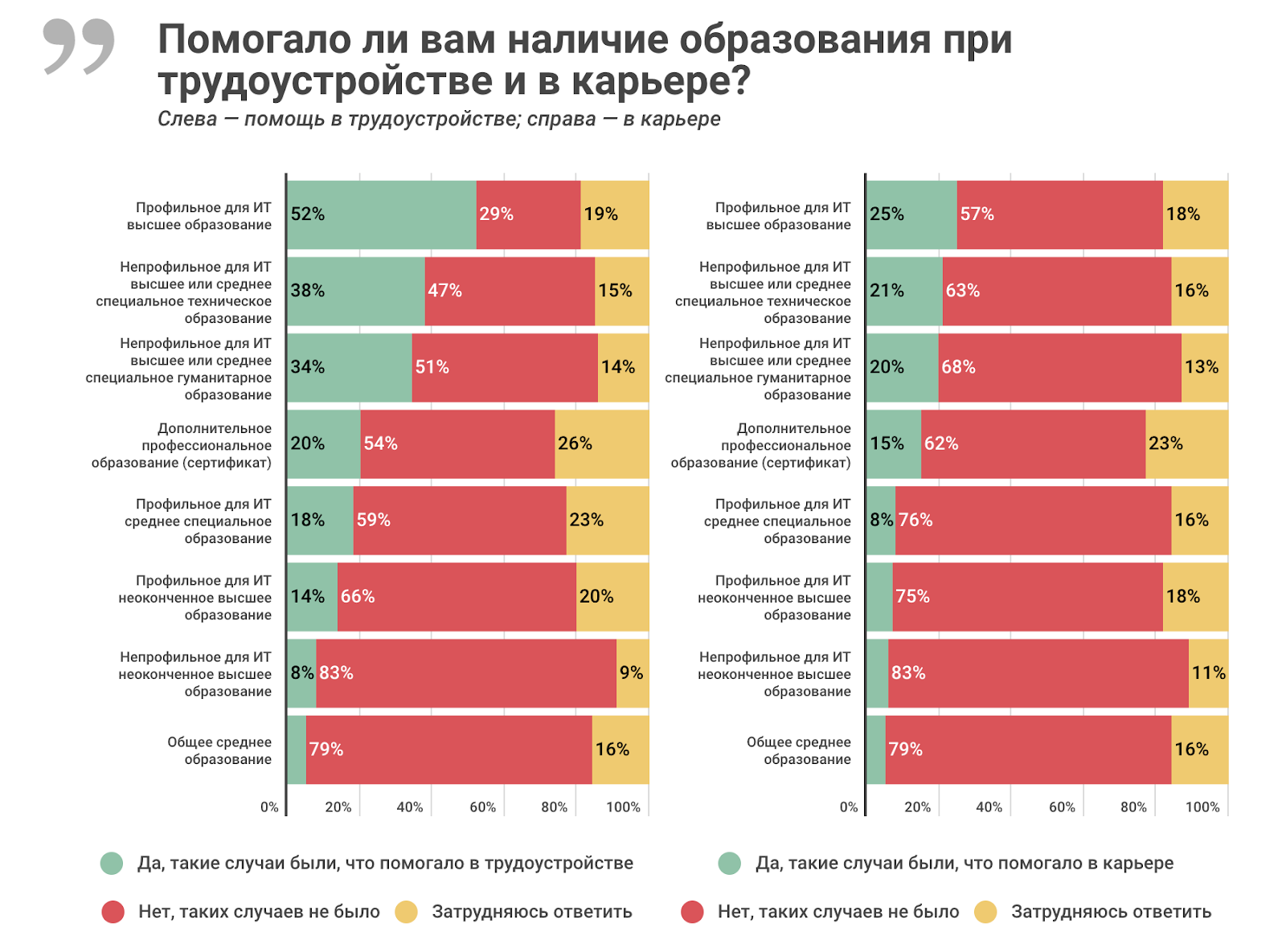
Now let's see how the employer looks at higher and further education.
It turns out that every second IT specialist is involved in evaluating new employees when hiring them. 50% of them are interested in higher and 45% in additional education. In 10-15% of cases, information about the candidate’s education significantly affects the decision to hire him.


60% of specialists in their companies have an HR department or a separate HR specialist: in large private companies there are almost always, in small private or state-owned companies in half the cases.
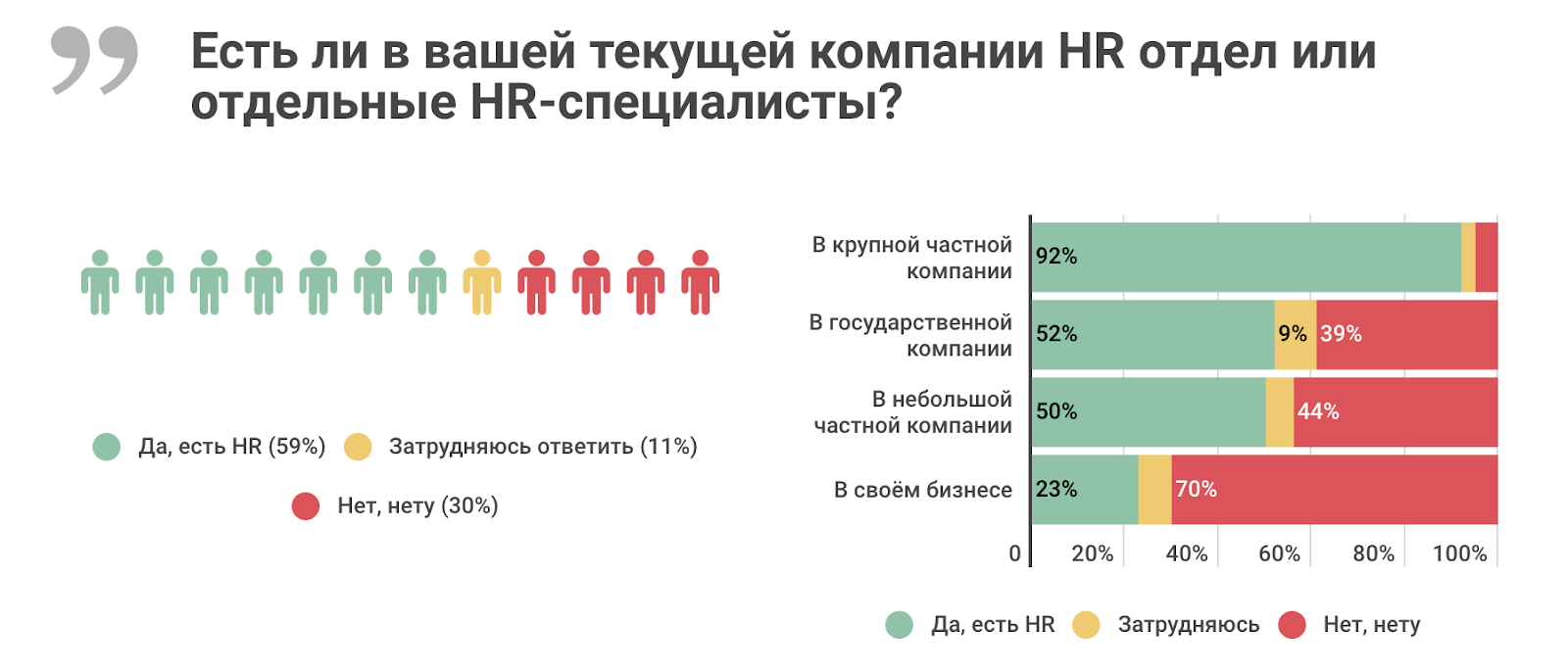
Companies that have HR are much more sensitive to the education of their personnel. In 45% of cases, such companies themselves take the initiative in educating their employees, and only in 14% of cases they do not help with education at all. Companies in which there is no dedicated HR function - only in 17% take the initiative, and in 30% of cases they do not help.
Engaged in the education of collaborators, employers pay almost the same attention to such formats as events, educational courses and meetings.
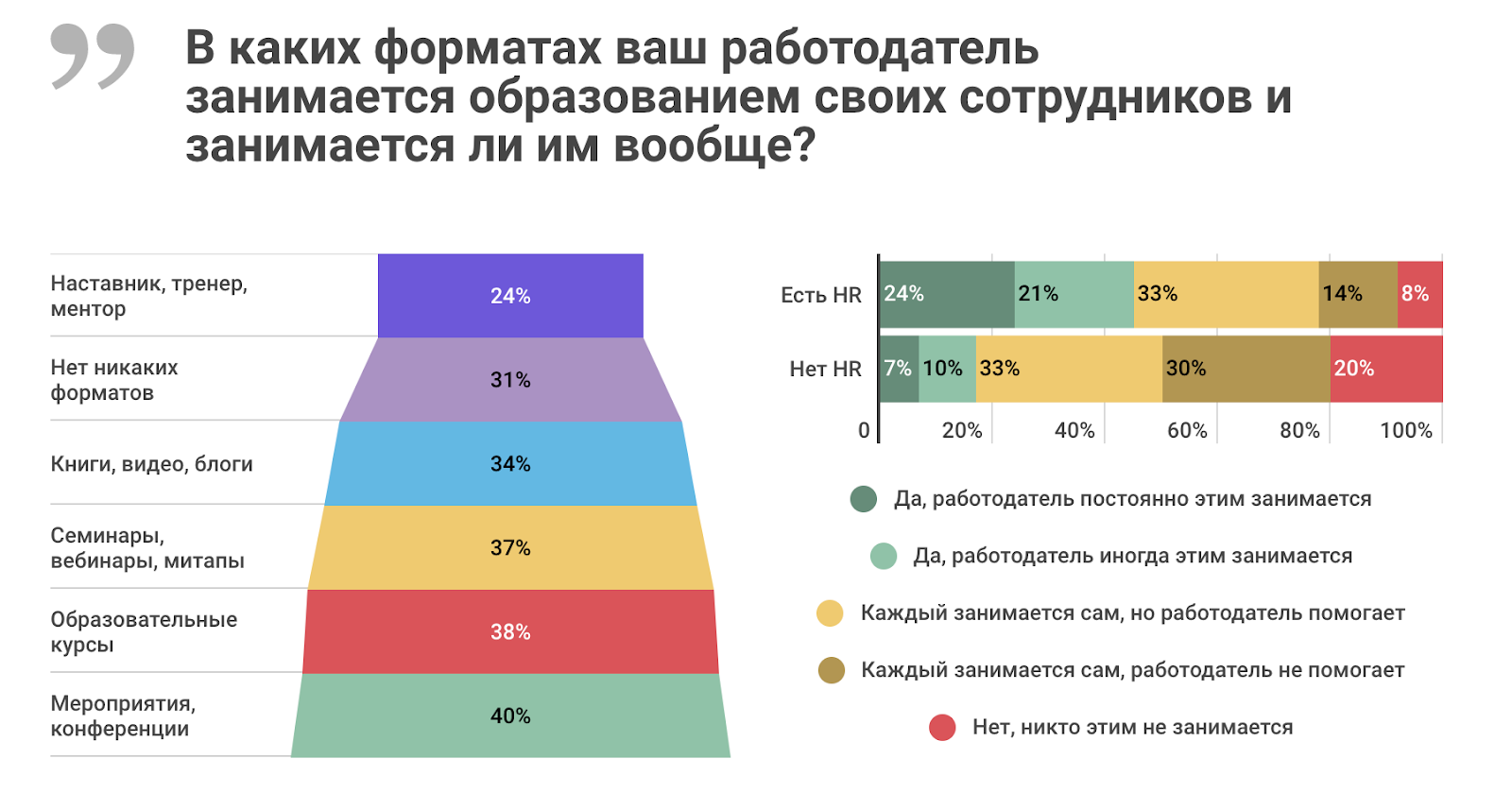
2. Why receive additional education
If you look at the whole, then most often they get additional education for: general development - 63%, solving current problems - 47% and getting a new profession - 40%. But if you look closely at the details, we will see some differences in goal setting, depending on the basic education available.
Among specialists with a basic education specialized for IT, about 70% receive additional education for general development, 30% for a new profession, 15% for a change in their field of activity.
And among specialists with non-core IT education, 50% - for general development, 50% - for getting a new profession, 30% - for changing the field of activity.
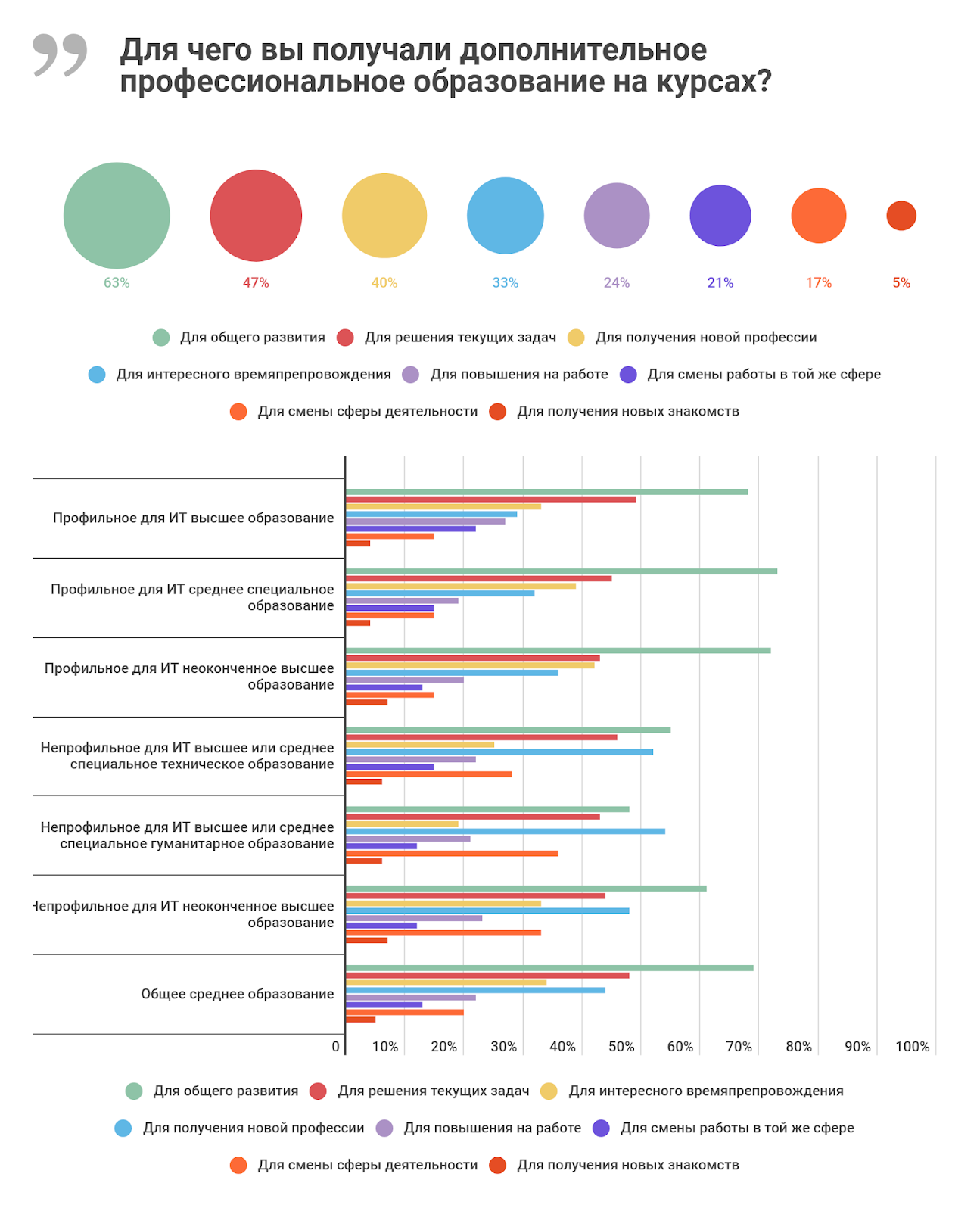
There are also differences in the sense of receiving additional education, depending on the current field of activity of the specialist.
With the help of additional education, current problems are more often solved by others (50-66%) in management and marketing, as well as in HR, administration, testing and support.
They get a new profession more often than others (50-67%) in content, front-end and mobile development.
For the sake of general interest, more often than others (46-48%) take courses in mobile and game development.
To get a promotion at work more often than others (30-36%), they take courses in sales, management and eychar.
Most of the specialists (29-31%) in front-end, game development and marketing study to change the field of activity.
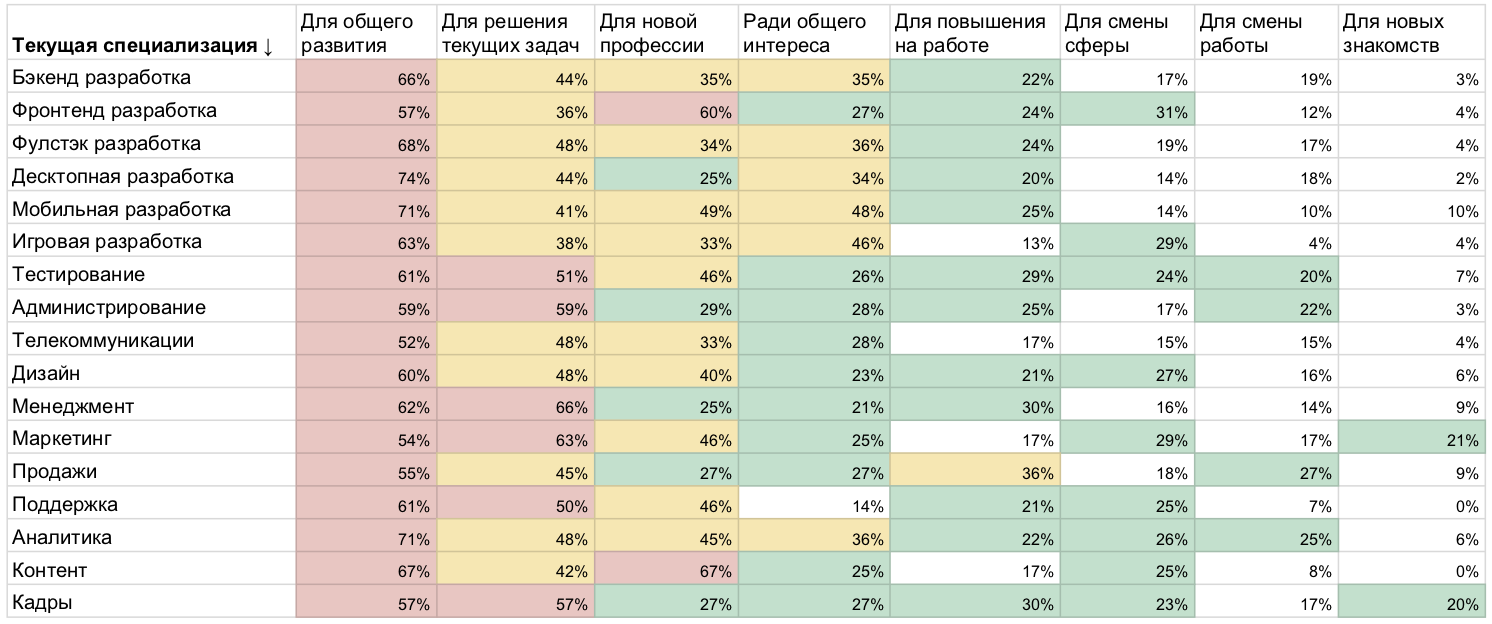
3. In what areas do they receive additional education?
It is logical that most specialists practice additional education in their current specialization. However, in practice, many people practice additional education not only in the area where they are currently working.
So, if we compare the number of specialists in each field with the number practicing education in this field, we will see that there are many more second ones than the first.
So, for example, if we have backend developers we have 24% of respondents, then 53% of respondents were engaged in education in the backend. There are 1.2 of those who work in the specialty of the backender who studied the backend, but are currently working in a different specialty.
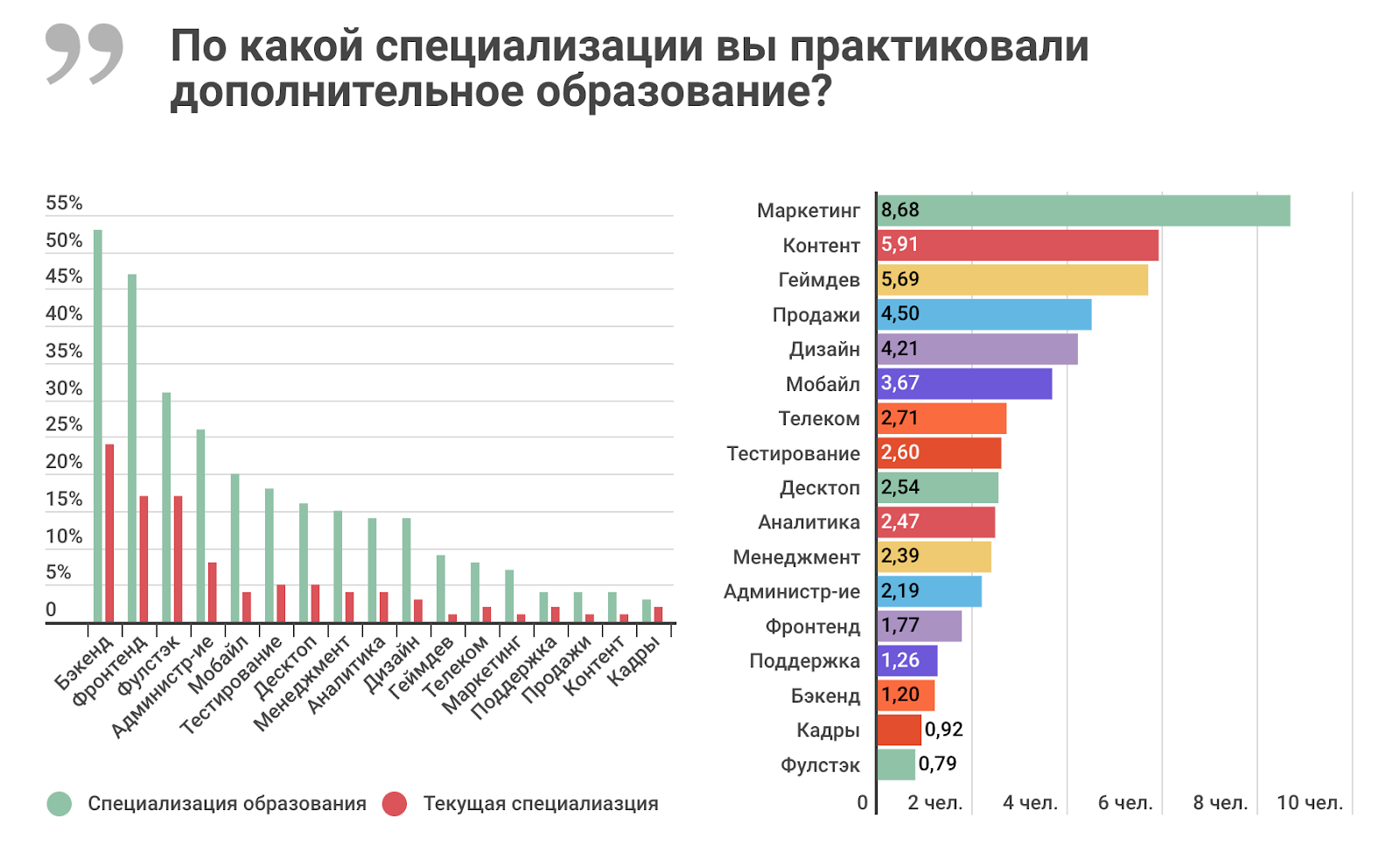
It is interesting to see how each of the educational fields is widely and deeply in demand by specialists from other fields.
The most popular, in this sense, are backend and frontend development: 20% or more specialists from 9 other areas noted that they studied in these specializations (highlighted in green, yellow and red). Administration is in second place - the same significant proportion of specialists from 6 other areas was noted here. The third is management - specialists from 5 other areas were noted here.
Specializations that are least popular in other areas of activity are HR and support. There are generally no areas in which 20% or more specialists would say that they studied in these areas.
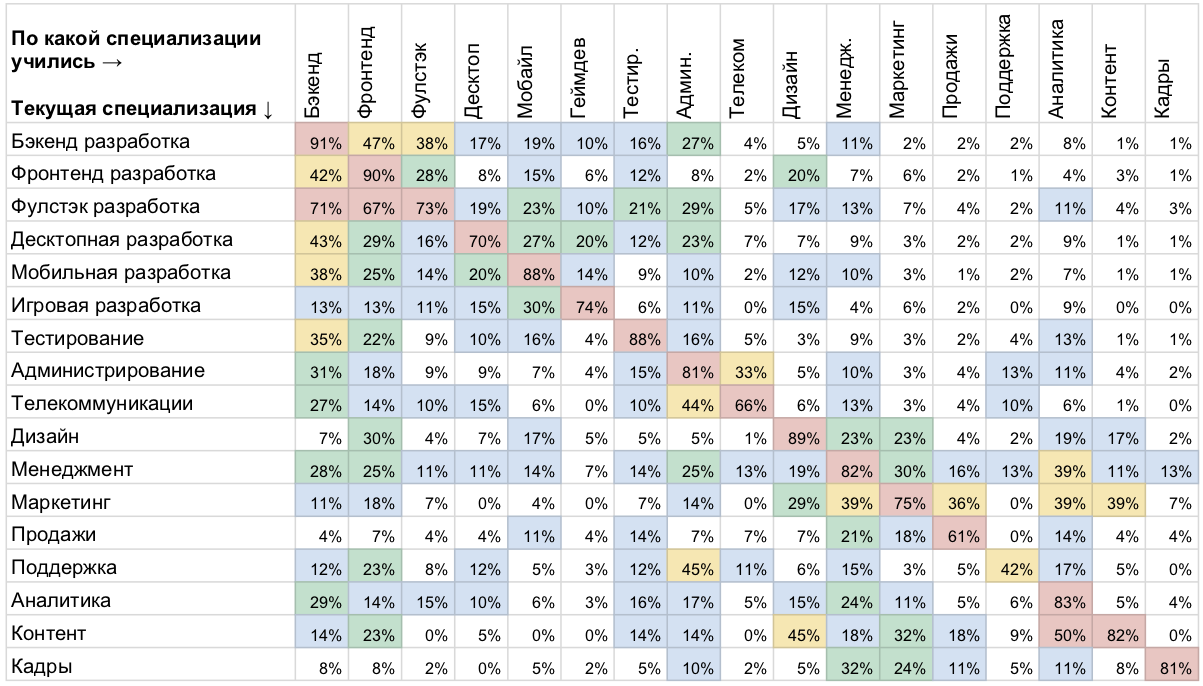
4. What qualifications does additional education provide?
In general, in 60% of cases, educational courses do not provide any new qualifications. Which is not surprising, if we recall that the main motives for obtaining additional education are the general development and solution of current problems.
After additional education, the most common are the dzhuns (18%), trainees (10%), and middle (7%). However, if you look in more detail, we will see quite large differences in the acquisition of new qualifications, depending on the areas of activity of IT specialists.
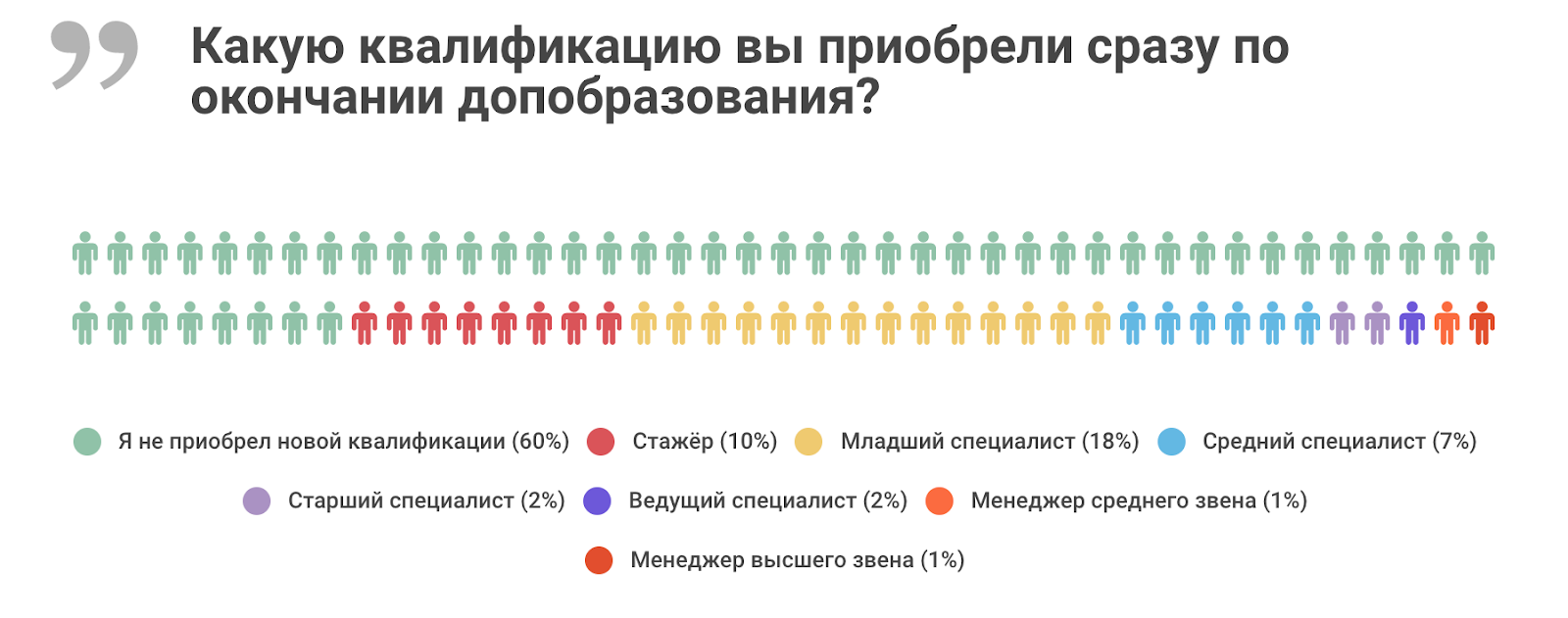
After the courses, most of the jones appear in the front-end and mobile development (33%), as well as in testing, marketing and game development (20-25%).
Most trainees are in sales (27%) and front-end (17%).
Most middles are in mobile development (11%) and administration (11%).
Most leads are in design (10%) and eychare (10%).
Most top managers are in marketing (13%) and management (6%).
It is curious that seniors - in more or less noticeable quantities - do not prepare educational courses in any specialties.
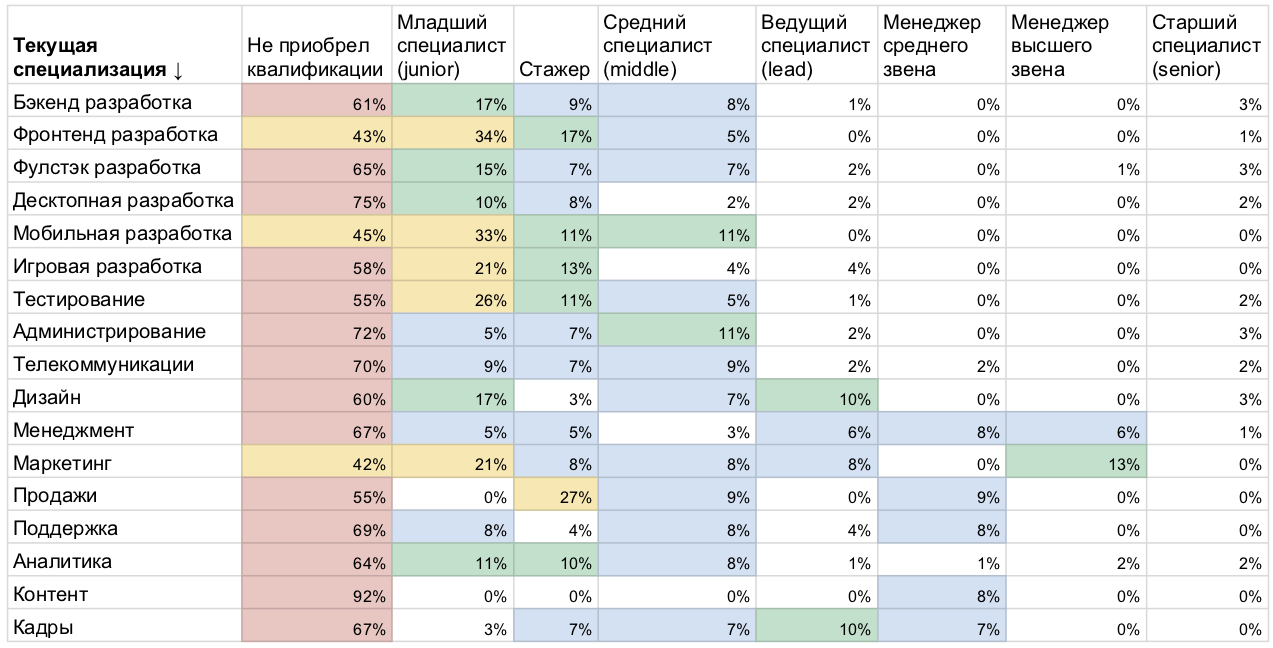
5. A little bit about additional education schools
More than half took courses in more than one additional school. The most important criteria by which courses are selected are the training program (74% noted this criterion) and the training format (54%).
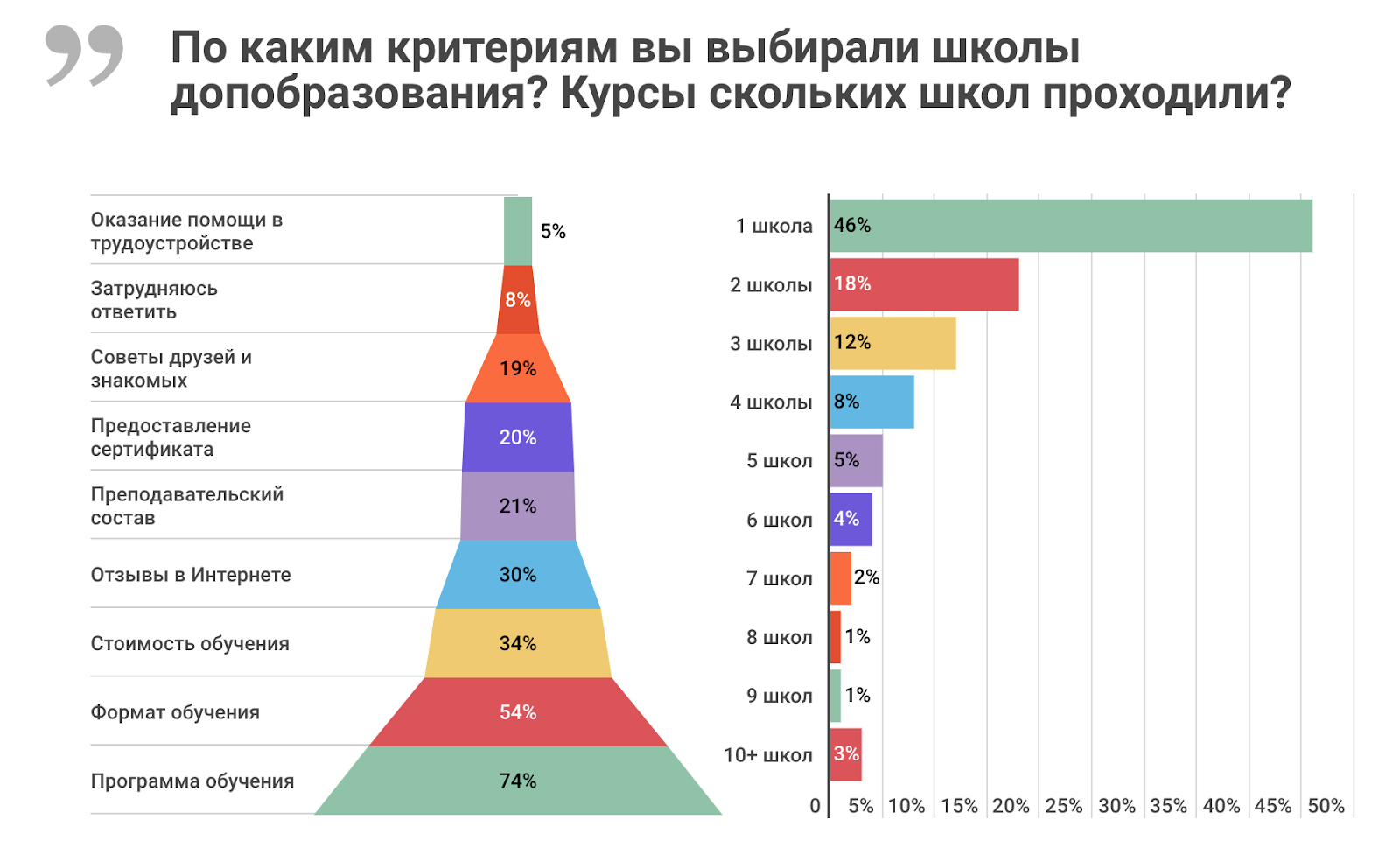
As we saw above, 65% of those who took additional education courses paid at least once for them. Two-thirds of those who attended paid courses and one-third of those who took free courses received a certificate of completion. Most believe that the main thing for such a certificate is that it should be recognized by the employer.
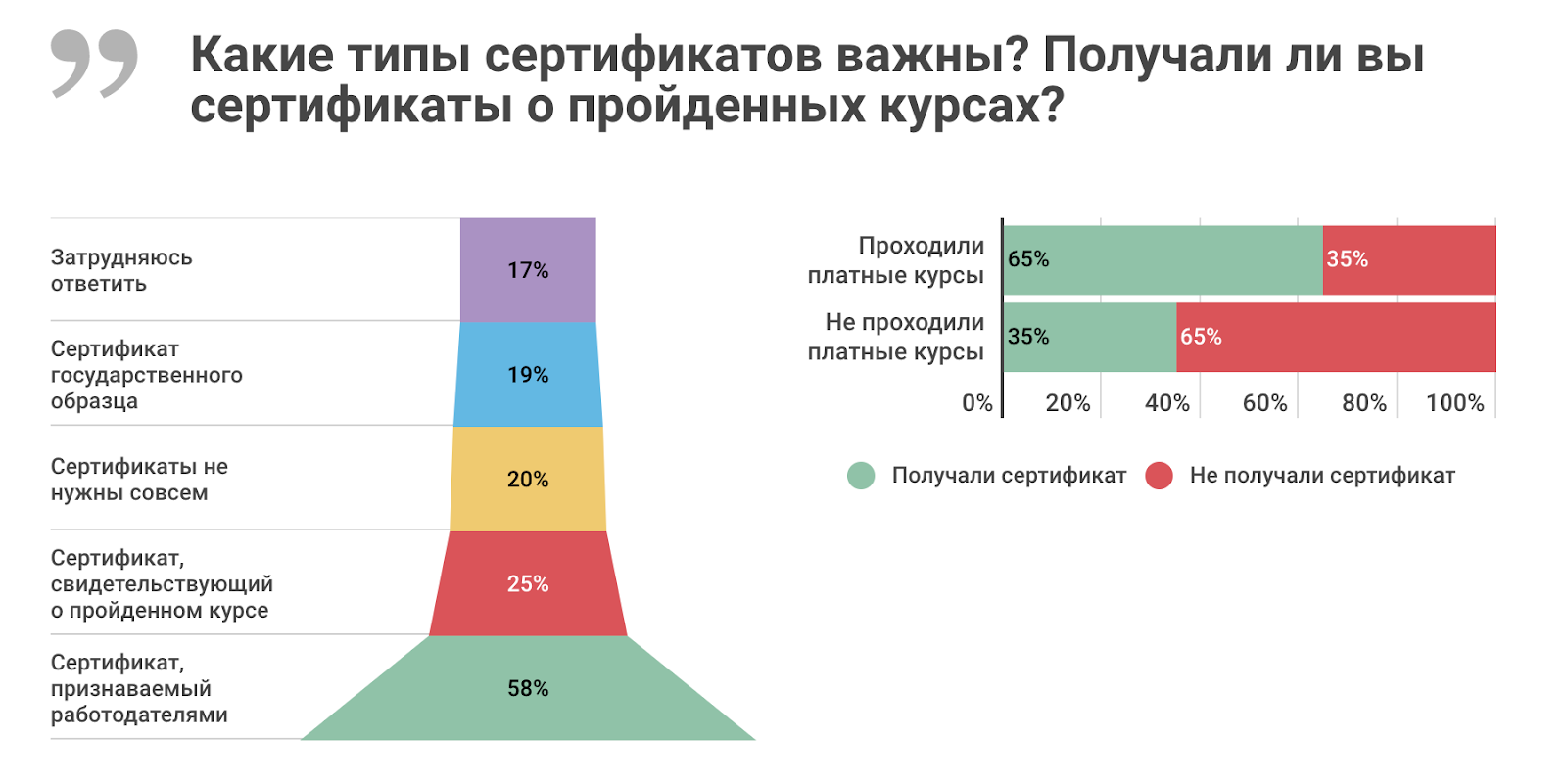
Although the majority note that the school of additional education did not help them in any way with employment, 23% of those who took free courses and 32% of those who took paid courses say that the school provides the experience necessary for work. The school also makes it possible to replenish the portfolio with projects or even directly employ its graduates.
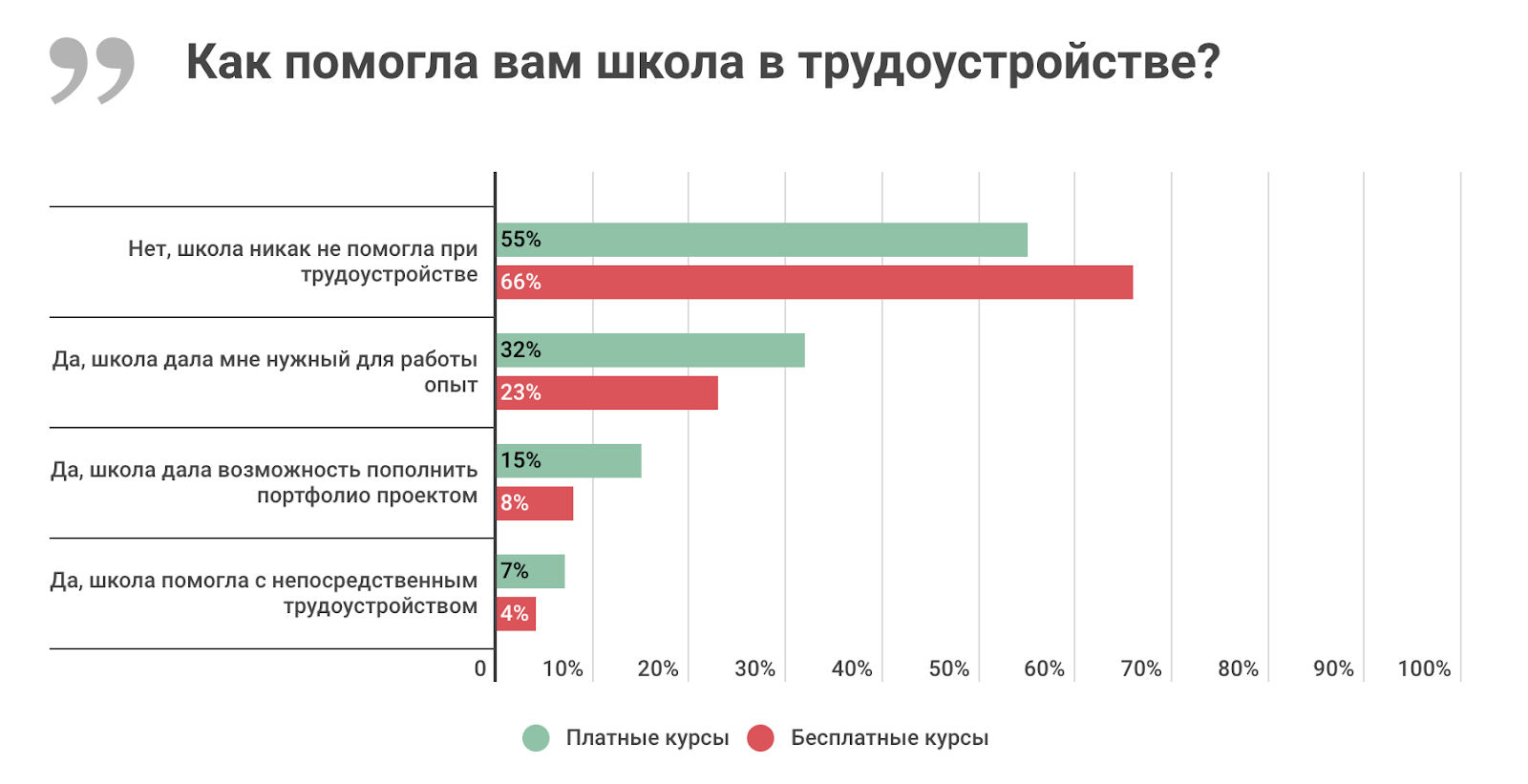
In the second part of our study, we will carefully consider all the schools of continuing education in IT currently existing, see which ones help graduates in employment and career better than others, and build their rating.
PS Who participated in the survey
About 3700 people took part in the survey:
- 87% of men, 13% of women, average age 27 years, half of respondents aged 23 to 30 years.
- 26% from Moscow, 13% from St. Petersburg, 20% from million-plus cities, 29% from other cities of Russia.
- 67% are developers, 8% are system administrators, 5% are testers, 4% are managers, 4% are analysts, 3% are designers.
- 35% of middle specialists (middle), 17% of junior specialists (junior), 17% of senior specialists (senior), 12% of leading specialists (lead), 7% of students, 4% of interns, middle and senior managers.
- 42% work in a small private company, 34% - in a large private company, 6% - in a state-owned company, 6% - freelancers, 2% have their own business, 10% are temporarily not working.
